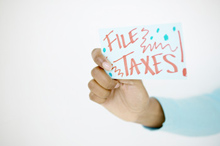What to Do if You Can’t Pay Your Taxes
by www.SixWise.com
April 15 is just around the corner, but not everyone will be breathing a sigh of relief once their tax returns are complete. Because for a growing number of Americans, those returns will come with a hefty tax bill, one that may be near impossible for you to pay.
|

If you can’t pay your tax bill in full, rule #1 is: You still need to file your return.
|
In fact, this year with the skyrocketing unemployment rates and home foreclosures and with already strained budgets for many families, even the IRS is expecting more taxpayers to come up short.
So if you your tax return is done and you’ve realized you won’t be able to pay Uncle Sam, don’t panic. The scenario is much more common than you may think, and the tips that follow will help you get the situation under control.
- File Your Return.
Not filing your return is a criminal act and one that you can go to jail for. So always file your tax return, even if you can’t send a payment along with it. All that will happen is you’ll get an automatically generated letter in return letting you know how much tax, plus interest, is due.
- Pay as Much as You Can.
If you can pay even a portion of your tax bill, go ahead and send it in along with your return. The IRS will send you an updated bill, plus interest, about 45 days later, and that may be enough time for you to gather up the rest of the payment.
- Consider All Your Cash Options.
The government is one of the few creditors who can actually garnish your wages or take any assets you have (other than your home and business). So if you can pay them off by borrowing from friends or relatives, using a home-equity loan or even using a low-interest credit card, it may be a wise move.
Even the IRS states on their Web site, “The interest rate a bank or credit card charges and any applicable fees are usually lower than the combination of interest and penalties imposed by the Internal Revenue Code.”
|

Many fear the IRS will seize their assets if they owe money on their taxes. However, if you communicate with the IRS and work out a payment plan this is very unlikely to happen.
|
In other words, you may be better off charging your tax bill than working out a payment plan with the IRS.
- Communicate With the IRS.
Many people try to hide from the IRS when they owe money. What they don’t realize is that the IRS is a vast bureaucracy with extensive systems in place to make sure they keep track of, and get, what they’re owed. As long as you communicate your situation to the IRS, you’ll be able to work out a payment plan, and the IRS may even waive penalties or provide a short-term extension on your tax bill.
- Consider a Payment Plan.
The IRS does offer payment plans that allow you to pay your tax bill over a period of months or years. Although there are fees involved, and you will be charged interest and penalties, these plans may make your tax payment much more manageable. You can find out more about installment agreements at this IRS Web site.
- Consider an “Offer In Compromise.”
If you were faced with extreme financial hardship in 2008, such as losing your home to foreclosure, you can apply for an offer in compromise (there is a $150 fee to fill out the application). Under this program the IRS will settle your tax bill for less than what you owe. To qualify, you must prove that you can’t pay the full tax bill, or that doing so would create an economic hardship.
Finally, be sure that you have maximized all of your deductions to minimize what you owe. If you haven’t yet filed, here are seven ways to lower your tax bill, or increase your refund, for your 2008 return.
Recommended Reading
Tax Audits: What Signs Make You More Likely to be Audited by the IRS?
How to Dig Yourself Out of Debt
Sources
MSN Money April 14, 2008
Walletpop.com